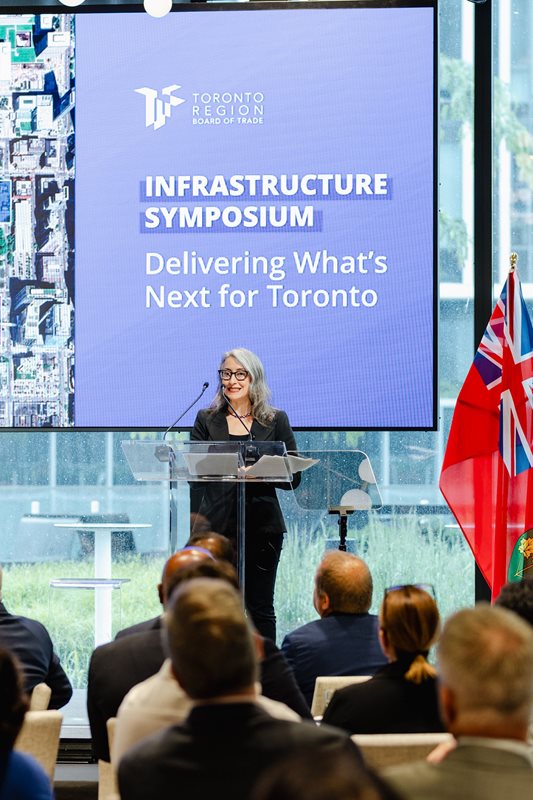
“Toronto is now the second-biggest infrastructure play in the world, after Riyadh,” said John Williams, President of Bechtel Infrastructure for Northeast US & Canada, Bechtel Corporation at our Infrastructure Symposium.
Surprising as it may be for Torontonians, the evidence is all around us: construction cranes crowd our skyline, and streets are dug up for years-long upgrades.
Coming as it does in the shadow of U.S. tariffs, this buildout brings enormous opportunity, but it also raises an urgent question: how do we deliver this infrastructure efficiently, affordably, and on time?
That question drove our Symposium. In an environment defined by capital constraints, supply chain pressures, and rising public expectations, the stakes have never been higher.
“If we’re serious about growth, about productivity, about resilience then infrastructure isn’t just a budget line. It’s a strategy. And the question we need to keep asking is not just what we build, but how we build,” said our President & CEO, Giles Gherson.
The symposium gathered leaders from government, finance, labour, and construction to share practical solutions that include better procurement models, smarter risk-sharing, stronger alliances, and the digitalization of delivery.
The delivery challenge is real and rising.
It’s no longer enough to focus on what we build. How we build, in terms of procurement, risk management, contracting, financing, and approvals is becoming the defining issue. A generational infrastructure push can only succeed with the right systems in place to coordinate efforts across jurisdictions, align capital and talent, and streamline outdated regulatory frameworks.
The big shift toward technology and collaboration is underway.
Speakers and panelists emphasized the transformation of infrastructure delivery from traditional civil engineering into a technology-enabled system. Lessons from international megaprojects like London’s Elizabeth Line show the importance of integrated delivery models, digital tools, and the alliance model where risk and reward are shared, not siloed.
Construction productivity is lagging and must be addressed.
Canada’s construction sector has seen stagnant or negative productivity for over two decades. Unlocking economic growth will require modernizing delivery tools, clearing regulatory bottlenecks, and addressing critical labour shortages. Without a skilled workforce and the digital capability to match global standards, major projects risk delay and cost overruns.
Governments are signaling readiness for reform.
From new legislation that standardizes permitting across municipalities, to streamlined housing approvals and bold investments in housing-enabling infrastructure, policy momentum is building. Public opinion is aligned, institutional readiness is high, and key stakeholders are calling for shared urgency across sectors.
$200b
Total public sector infrastructure investment required in Canada over the next decade, as referenced by Bechtel’s John Williams.
$30b
The size of the City of Toronto’s municipal infrastructure deficit, a backlog of critical repair and renewal needs.
700,000 workers
Estimated number of skilled tradespeople needed in Canada by 2028 to meet infrastructure and housing demands.
$2.3b
Funding envelope for the new East Harbour Transit Hub, supporting multi-modal transit access in Toronto’s east end.
85%
Portion of the public that believes infrastructure investment should be a top priority for government based on recent polling.

“I hear a lot about red tape, and I want to be very clear, I am committed to eliminating unnecessary regulations and removing barriers. If there’s a tool you need to get things done faster, I want to know about it.”
— The Honourable Kinga Surma, Provincial Minister of Infrastructure
"We’ve had negative productivity growth in construction since 1998. That’s not just a stat, it’s a warning bell. We need digital tools, modern processes, and serious investment in training if we want to turn that around."
— Tim Coldwell, President & CEO, Énska Advisors

“We can’t build innovation if our institutions are working in silos. Every investment we make has to drive not just infrastructure, but also research, commercialization, and capacity for the future.”
— Leah Cowen, Vice-President, Research and Innovation, and Strategic Initiatives, University of Toronto
“We can’t achieve affordable housing goals if permitting and approvals are unpredictable. Getting shovels in the ground faster requires more than funding, it requires regulatory clarity.”
— Mathieu Laberge, Chief Economist & SVP, Housing Insights, Canada Mortgage and Housing Corporation
“We can’t scale infrastructure if every project requires reinventing the wheel. We need standardized delivery models that allow teams to build trust and replicate success.”
— Matt Woodbeck, Partner & Executive Director of Water & Infrastructure, CIMA+
“An alliance model isn’t just something we read about in the UK. We’re proving it works here in Toronto. The East Harbour project is showing how shared accountability can reduce conflict and increase speed.”
— Jane Ogilvie, Alliance Director, East Harbour Transit Hub, AtkinsRéalis

“Project delivery timelines are colliding with funding cycles, workforce shortages, and rising costs. Unless we synchronize those moving parts, our ambitions will outpace our ability to act.”
— Alena Thouin, Chief Strategy and Operations Officer, Building Ontario Fund


